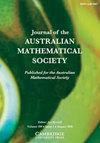求助PDF
{"title":"有限简单奇维正交群的-生成","authors":"MARCO ANTONIO PELLEGRINI, MARIA CHIARA TAMBURINI BELLANI","doi":"10.1017/s1446788724000016","DOIUrl":null,"url":null,"abstract":"The complete classification of the finite simple groups that are <jats:inline-formula> <jats:alternatives> <jats:inline-graphic xmlns:xlink=\"http://www.w3.org/1999/xlink\" mime-subtype=\"png\" xlink:href=\"S1446788724000016_inline2.png\" /> <jats:tex-math> $(2,3)$ </jats:tex-math> </jats:alternatives> </jats:inline-formula>-generated is a problem which is still open only for orthogonal groups. Here, we construct <jats:inline-formula> <jats:alternatives> <jats:inline-graphic xmlns:xlink=\"http://www.w3.org/1999/xlink\" mime-subtype=\"png\" xlink:href=\"S1446788724000016_inline3.png\" /> <jats:tex-math> $(2, 3)$ </jats:tex-math> </jats:alternatives> </jats:inline-formula>-generators for the finite odd-dimensional orthogonal groups <jats:inline-formula> <jats:alternatives> <jats:inline-graphic xmlns:xlink=\"http://www.w3.org/1999/xlink\" mime-subtype=\"png\" xlink:href=\"S1446788724000016_inline4.png\" /> <jats:tex-math> $\\Omega _{2k+1}(q)$ </jats:tex-math> </jats:alternatives> </jats:inline-formula>, <jats:inline-formula> <jats:alternatives> <jats:inline-graphic xmlns:xlink=\"http://www.w3.org/1999/xlink\" mime-subtype=\"png\" xlink:href=\"S1446788724000016_inline5.png\" /> <jats:tex-math> $k\\geq 4$ </jats:tex-math> </jats:alternatives> </jats:inline-formula>. As a byproduct, we also obtain <jats:inline-formula> <jats:alternatives> <jats:inline-graphic xmlns:xlink=\"http://www.w3.org/1999/xlink\" mime-subtype=\"png\" xlink:href=\"S1446788724000016_inline6.png\" /> <jats:tex-math> $(2,3)$ </jats:tex-math> </jats:alternatives> </jats:inline-formula>-generators for <jats:inline-formula> <jats:alternatives> <jats:inline-graphic xmlns:xlink=\"http://www.w3.org/1999/xlink\" mime-subtype=\"png\" xlink:href=\"S1446788724000016_inline7.png\" /> <jats:tex-math> $\\Omega _{4k}^+(q)$ </jats:tex-math> </jats:alternatives> </jats:inline-formula> with <jats:inline-formula> <jats:alternatives> <jats:inline-graphic xmlns:xlink=\"http://www.w3.org/1999/xlink\" mime-subtype=\"png\" xlink:href=\"S1446788724000016_inline8.png\" /> <jats:tex-math> $k\\geq 3$ </jats:tex-math> </jats:alternatives> </jats:inline-formula> and <jats:italic>q</jats:italic> odd, and for <jats:inline-formula> <jats:alternatives> <jats:inline-graphic xmlns:xlink=\"http://www.w3.org/1999/xlink\" mime-subtype=\"png\" xlink:href=\"S1446788724000016_inline9.png\" /> <jats:tex-math> $\\Omega _{4k+2}^\\pm (q)$ </jats:tex-math> </jats:alternatives> </jats:inline-formula> with <jats:inline-formula> <jats:alternatives> <jats:inline-graphic xmlns:xlink=\"http://www.w3.org/1999/xlink\" mime-subtype=\"png\" xlink:href=\"S1446788724000016_inline10.png\" /> <jats:tex-math> $k\\geq 4$ </jats:tex-math> </jats:alternatives> </jats:inline-formula> and <jats:inline-formula> <jats:alternatives> <jats:inline-graphic xmlns:xlink=\"http://www.w3.org/1999/xlink\" mime-subtype=\"png\" xlink:href=\"S1446788724000016_inline11.png\" /> <jats:tex-math> $q\\equiv \\pm 1~ \\mathrm {(mod~ 4)}$ </jats:tex-math> </jats:alternatives> </jats:inline-formula>.","PeriodicalId":50007,"journal":{"name":"Journal of the Australian Mathematical Society","volume":"119 50 1","pages":""},"PeriodicalIF":0.8000,"publicationDate":"2024-02-28","publicationTypes":"Journal Article","fieldsOfStudy":null,"isOpenAccess":false,"openAccessPdf":"","citationCount":"0","resultStr":"{\"title\":\"THE -GENERATION OF THE FINITE SIMPLE ODD-DIMENSIONAL ORTHOGONAL GROUPS\",\"authors\":\"MARCO ANTONIO PELLEGRINI, MARIA CHIARA TAMBURINI BELLANI\",\"doi\":\"10.1017/s1446788724000016\",\"DOIUrl\":null,\"url\":null,\"abstract\":\"The complete classification of the finite simple groups that are <jats:inline-formula> <jats:alternatives> <jats:inline-graphic xmlns:xlink=\\\"http://www.w3.org/1999/xlink\\\" mime-subtype=\\\"png\\\" xlink:href=\\\"S1446788724000016_inline2.png\\\" /> <jats:tex-math> $(2,3)$ </jats:tex-math> </jats:alternatives> </jats:inline-formula>-generated is a problem which is still open only for orthogonal groups. Here, we construct <jats:inline-formula> <jats:alternatives> <jats:inline-graphic xmlns:xlink=\\\"http://www.w3.org/1999/xlink\\\" mime-subtype=\\\"png\\\" xlink:href=\\\"S1446788724000016_inline3.png\\\" /> <jats:tex-math> $(2, 3)$ </jats:tex-math> </jats:alternatives> </jats:inline-formula>-generators for the finite odd-dimensional orthogonal groups <jats:inline-formula> <jats:alternatives> <jats:inline-graphic xmlns:xlink=\\\"http://www.w3.org/1999/xlink\\\" mime-subtype=\\\"png\\\" xlink:href=\\\"S1446788724000016_inline4.png\\\" /> <jats:tex-math> $\\\\Omega _{2k+1}(q)$ </jats:tex-math> </jats:alternatives> </jats:inline-formula>, <jats:inline-formula> <jats:alternatives> <jats:inline-graphic xmlns:xlink=\\\"http://www.w3.org/1999/xlink\\\" mime-subtype=\\\"png\\\" xlink:href=\\\"S1446788724000016_inline5.png\\\" /> <jats:tex-math> $k\\\\geq 4$ </jats:tex-math> </jats:alternatives> </jats:inline-formula>. As a byproduct, we also obtain <jats:inline-formula> <jats:alternatives> <jats:inline-graphic xmlns:xlink=\\\"http://www.w3.org/1999/xlink\\\" mime-subtype=\\\"png\\\" xlink:href=\\\"S1446788724000016_inline6.png\\\" /> <jats:tex-math> $(2,3)$ </jats:tex-math> </jats:alternatives> </jats:inline-formula>-generators for <jats:inline-formula> <jats:alternatives> <jats:inline-graphic xmlns:xlink=\\\"http://www.w3.org/1999/xlink\\\" mime-subtype=\\\"png\\\" xlink:href=\\\"S1446788724000016_inline7.png\\\" /> <jats:tex-math> $\\\\Omega _{4k}^+(q)$ </jats:tex-math> </jats:alternatives> </jats:inline-formula> with <jats:inline-formula> <jats:alternatives> <jats:inline-graphic xmlns:xlink=\\\"http://www.w3.org/1999/xlink\\\" mime-subtype=\\\"png\\\" xlink:href=\\\"S1446788724000016_inline8.png\\\" /> <jats:tex-math> $k\\\\geq 3$ </jats:tex-math> </jats:alternatives> </jats:inline-formula> and <jats:italic>q</jats:italic> odd, and for <jats:inline-formula> <jats:alternatives> <jats:inline-graphic xmlns:xlink=\\\"http://www.w3.org/1999/xlink\\\" mime-subtype=\\\"png\\\" xlink:href=\\\"S1446788724000016_inline9.png\\\" /> <jats:tex-math> $\\\\Omega _{4k+2}^\\\\pm (q)$ </jats:tex-math> </jats:alternatives> </jats:inline-formula> with <jats:inline-formula> <jats:alternatives> <jats:inline-graphic xmlns:xlink=\\\"http://www.w3.org/1999/xlink\\\" mime-subtype=\\\"png\\\" xlink:href=\\\"S1446788724000016_inline10.png\\\" /> <jats:tex-math> $k\\\\geq 4$ </jats:tex-math> </jats:alternatives> </jats:inline-formula> and <jats:inline-formula> <jats:alternatives> <jats:inline-graphic xmlns:xlink=\\\"http://www.w3.org/1999/xlink\\\" mime-subtype=\\\"png\\\" xlink:href=\\\"S1446788724000016_inline11.png\\\" /> <jats:tex-math> $q\\\\equiv \\\\pm 1~ \\\\mathrm {(mod~ 4)}$ </jats:tex-math> </jats:alternatives> </jats:inline-formula>.\",\"PeriodicalId\":50007,\"journal\":{\"name\":\"Journal of the Australian Mathematical Society\",\"volume\":\"119 50 1\",\"pages\":\"\"},\"PeriodicalIF\":0.8000,\"publicationDate\":\"2024-02-28\",\"publicationTypes\":\"Journal Article\",\"fieldsOfStudy\":null,\"isOpenAccess\":false,\"openAccessPdf\":\"\",\"citationCount\":\"0\",\"resultStr\":null,\"platform\":\"Semanticscholar\",\"paperid\":null,\"PeriodicalName\":\"Journal of the Australian Mathematical Society\",\"FirstCategoryId\":\"100\",\"ListUrlMain\":\"https://doi.org/10.1017/s1446788724000016\",\"RegionNum\":4,\"RegionCategory\":\"数学\",\"ArticlePicture\":[],\"TitleCN\":null,\"AbstractTextCN\":null,\"PMCID\":null,\"EPubDate\":\"\",\"PubModel\":\"\",\"JCR\":\"Q3\",\"JCRName\":\"MATHEMATICS\",\"Score\":null,\"Total\":0}","platform":"Semanticscholar","paperid":null,"PeriodicalName":"Journal of the Australian Mathematical Society","FirstCategoryId":"100","ListUrlMain":"https://doi.org/10.1017/s1446788724000016","RegionNum":4,"RegionCategory":"数学","ArticlePicture":[],"TitleCN":null,"AbstractTextCN":null,"PMCID":null,"EPubDate":"","PubModel":"","JCR":"Q3","JCRName":"MATHEMATICS","Score":null,"Total":0}
引用次数: 0
引用
批量引用
THE -GENERATION OF THE FINITE SIMPLE ODD-DIMENSIONAL ORTHOGONAL GROUPS
The complete classification of the finite simple groups that are $(2,3)$ -generated is a problem which is still open only for orthogonal groups. Here, we construct $(2, 3)$ -generators for the finite odd-dimensional orthogonal groups $\Omega _{2k+1}(q)$ , $k\geq 4$ . As a byproduct, we also obtain $(2,3)$ -generators for $\Omega _{4k}^+(q)$ with $k\geq 3$ and q odd, and for $\Omega _{4k+2}^\pm (q)$ with $k\geq 4$ and $q\equiv \pm 1~ \mathrm {(mod~ 4)}$ .

 求助内容:
求助内容: 应助结果提醒方式:
应助结果提醒方式:


